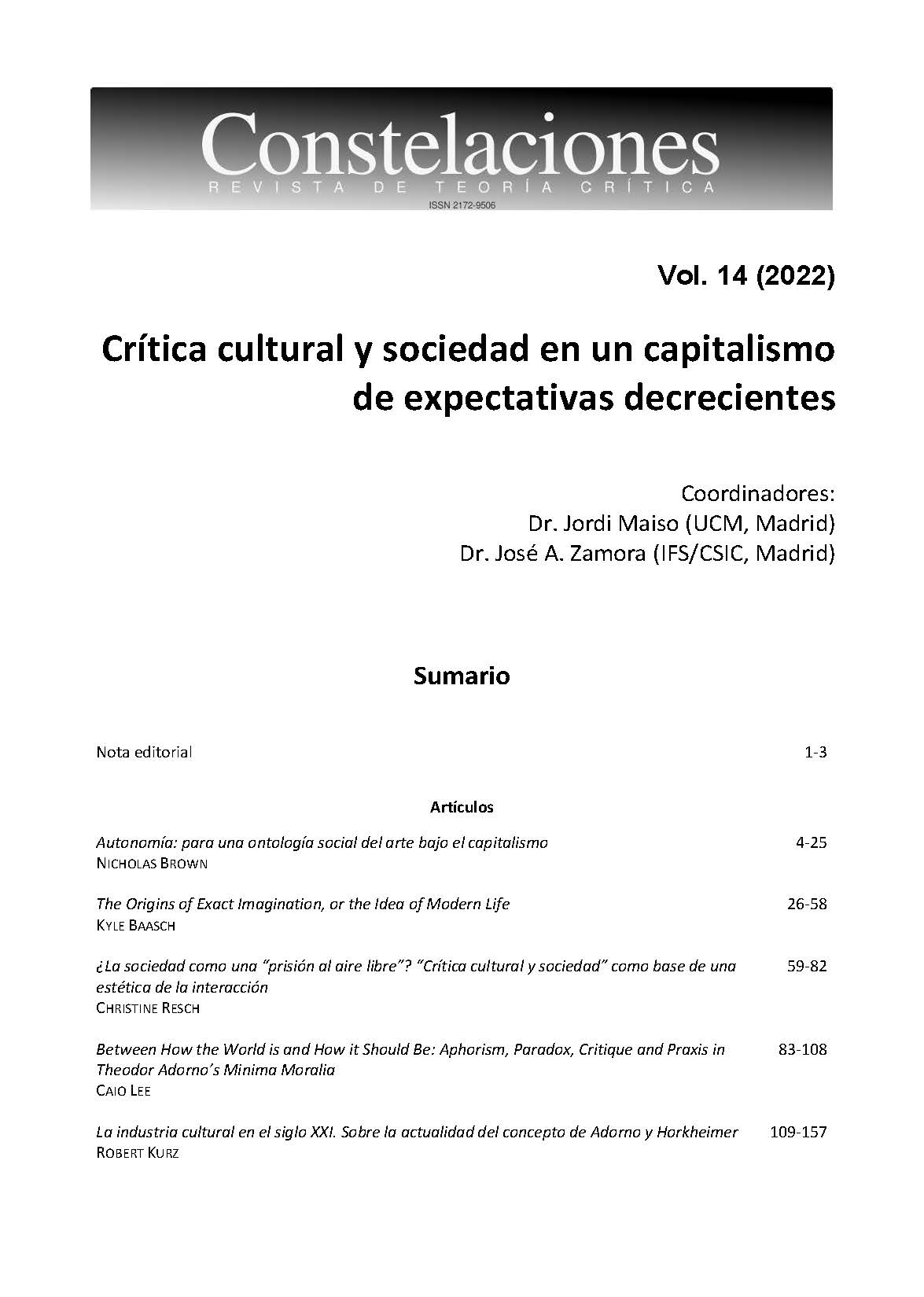Repressive Democracy
Keywords:
Democracia represiva - Democracia capitalista - Manipulación ideológica - Economía represiva - Herbert Marcuse - Theodor Adorno, Repressive Democracy - Capitalist Democracy - Ideological Manipulation - Repressive Economy - Herbert Marcuse - Theodor AdornoAbstract
Resumen
En la democracia imperante en la sociedad capitalista contemporánea se desarrolla una violencia estructural interna que diariamente reproduce la represión y normaliza la violencia en todas las dimensiones de la vida social. Esto genera estructuras de poder autoritarias e incluso neofascistas a nivel social y político. Este marco define lo que se denomina “democracia represiva”. La persistencia de estas condiciones objetivas para el desarrollo del autoritarismo es explicada por Adorno -en Aspectos de lo Nuevo Extremismo de Derecha- a partir de las formas de manipular y engañar a las masas mantenidas en la democracia actual aún con el fin del fascismo. Para Marcuse – en El Destino Histórico de la Democracia Burguesa – se trata de la represión autonomizada a partir de la imposición permanente en la vida social y política de la democracia actual por parte del orden económico de acumulación capitalista, generando concentración del capital con desigualdad y exclusión de la población. Para Adorno, la superación de este autoritarismo de extrema derecha pasa sobre todo por una educación democrática dirigida a la generación de sujetos emancipados por la autonomía. Según Marcuse, la superación del autoritarismo totalitario implica acciones políticas prácticas para democratizar la democracia represiva por parte de todos aquellos sometidos a la dominación a través de la acumulación de capital. Es un proceso de liberación sustentado en nuevas experiencias no represivas, presentes tendencialmente aunque obstruidas, en la relación entre la organización social y política y el proceso de reproducción económico-capitalista.
Abstract
An internal structural development in the prevailing democracy of contemporary capitalist society reproduces repression and normalizes violence in all dimensions of social life, generating authoritarian and even neo-fascist power structures on the social and political level. This framework defines what is called “repressive democracy”. The persistence of these objective conditions for the development of authoritarianism is explained by Adorno - as in Aspects of the New Right-Wing Extremism - as the ways of manipulating and deceiving the masses maintained in current democracy even with the end of fascism. For Marcuse – as in The Historical Fate of Bourgeois Democracy – it is about the autonomy of the repression with the permanent imposition on the social and political life of the current democracy by the economic order of capitalist accumulation, generating capital concentration with inequality and population exclusion. For Adorno, overcoming this extreme right-wing authoritarianism demands a democratic education aimed at the generation of subjects emancipated by autonomy. According to Marcuse, overcoming totalitarian authoritarianism involves practical political actions to democratize repressive democracy on the part of all those subjected to domination through capital accumulation. It is a process of liberation supported by new non-repressive experiences, tending to be present, although obstructed, in the relationship between social and political organization and the process of economic-capitalist reproduction.
Downloads
References
ADORNO, Theodor. W. (2005): “The Meaning of Working through the Past”, in ADORNO, Theodor W. (2005): Critical Models – Interventions and Catchwords. New York: Columbia University Pres, 89-104.
ADORNO, Theodor W. (2020): Aspects of the New Right-Wing Extremism. Cambridge: Polity
BADIOU, Alain (2020): Trump. Paris: PUF
BROWN, Wendy (2009): “Nous sommes tous démocrats à present”, in AGAMBEN, Giorgio et al. (2009): Démocratie, dans quel état? Paris: La fabrique, 59-75.
KOSELLECK, Reinhart (2004): Futures Past. New York: Columbia University Press.
MARCUSE, Herbert (1968): “The Struggle against Liberalism in the Totalitarian View of the State”, in MARCUSE, Herbert (1968) – Negations. London: Penguin, 3-42
MARCUSE, Herbert (1971): “Nachwort”, in BENJAMIN, Walter (1971): Zur Kritik der Gewalt und andere Aufsätze. Frankfurt am Main: Suhrkamp, 97-107.
MARCUSE, Herbert (1991): One-Dimensional Man. Boston: Beacon Press.
MARCUSE, Herbert (2001): “The Historical Fate of Bourgeois Democracy”, in MARCUSE, Herbert (2001): Towards a Critical Theory of Society. London: Routledge: 163-186.
MARCUSE, Herbert (2007): “Repressive Tolerance”, in MARCUSE, Herbert (2007): The essential Marcuse. Boston: Beacon Press, 32-59.
NEGT, Oskar (1999): “Marcuses dialektisches Verständnis von Demokratie”, in MARCUSE, Herbert (1999): Nachgelassene Schriften – Band 1: Das Schicksal der bürgerlichen Demokratie. Lüneburg: zu Klampen, 12-25.
RANCIÈRE, Jacques (2009): “Les démocraties contre la démocratie”, in AGAMBEN, Giorgio et al. (2009): Démocratie, dans quel état? Paris: La fabrique, 95-100.
RIMBAUD, Arthur (1964): “Démocratie”, in Oeuvres Poétiques. Paris: Garnier Flammarion.
Downloads
Published
How to Cite
Issue
Section
License
Copyright (c) 2022 Wolfgang Leo Maar

This work is licensed under a Creative Commons Attribution-NonCommercial-ShareAlike 4.0 International License.
Authors who have publications with this journal accept the following terms:
1. Authors will retain their copyright and grant the journal the right of first publication of their work, which will be simultaneously subject to the License of recognition of Creative Commons CC BY-NC-SA 4.0 that allows third parties to share, redistribute and adapt the work provided it is for non-commercial purposes and its author and first publication in this journal is indicated.
2. Authors may adopt other non-exclusive distribution license agreements for the version of the published work (e.g., depositing it in an institutional electronic archive or publishing it in a monographic volume) provided that the initial publication in this journal is indicated.
3. Authors are permitted and encouraged to disseminate their work via the Internet (e.g., in institutional telematic archives or on their website) before and during the submission process, which can produce interesting exchanges and increase citations of the published work. (See The Effect of Open Access).
Data confidentiality
1. Constelaciones. Revista de Teoría Crítica guarantees that the data you send us will only be used to meet the requests made in this message.
2. Your data will not be passed on to third parties.
3. You may request that your data be removed from our records at any time.





